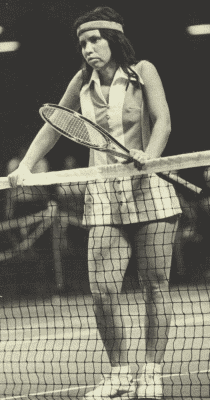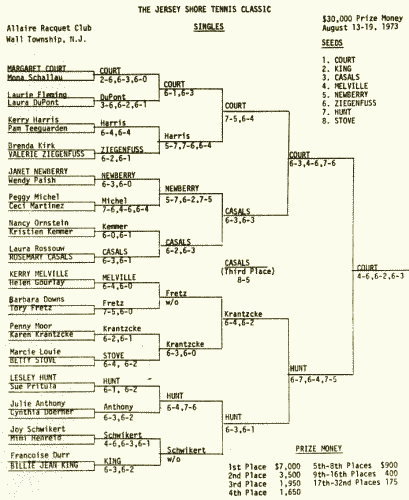|
Excerpts from A Long Way, Baby by Grace Lichtenstein, 1974, Morrow Out of print, but still readily obtainable used from Amazon.com via the link above. A Long Way, Baby covers events on the Virginia Slims women's pro tennis tour and it's rival, the USLTA women's tennis tour, during 1973, the year the Women's Tennis Association was formed. The book focuses on describing players' personalites, including Billie Jean King, Margaret Smith Court, Rosemary Casals, and Chris Evert, Jeanne Evert, Julie Heldman, Julie "Doc" Anthony, and others. Although the book is a worthwhile reference to the people and events of the time, it unfortunately is so focused on the people, and whether or not the author liked them, that the reader is left with many unanswered questions about the events. Only passing reference is made to the formation of the Women's Tennis Association (stating that in the early meetings Billie Jean King did almost all the talking while the other players listened), without noting anything about the date of or reason for its formation, or its early agenda. Despite the uncovered territory, the book is pleasant reading, and an interesting account of some of the players in the early days of women's pro tennis. It also has 2 sections of nice black & white photos, both on and off court. Rosemary Casals photo from the book
|
 | ||
| |||
|
Give That Lady a Cigar (pages 185-192): Rosie was the favorite... of about 3,000 Jersey shore vacationers who packed the stands under the high, wood-beamed ceiling of the Allaire Racquet Club for the Casals-Court semifinal. Rosie had played sensational tennis all week, and the fans also realized that if she did not beat Margaret, neither Krantzcke nor Hunt, who faced one another in the semi, were likely to. None of the fans disliked Margaret. It was just that she had won eleven of the fourteen Slims tournaments already during the year, and Rosie had won only one--the Family Circle event with its $30,000 first prize check. Rosie was the decided underdog. Since their epic battle in Philadelphia in April, she had played Margaret only once, in Nashville, and had lost again, 6-4, 6-2... ...At the Philadelphia match she had been just a gutsy little Indian fighting the John Wayne of women's tennis. Now, she was also a friend... I saw that everyone in the press corps behind one of the glass windows in the corridor was cheering for Rosie, too... The first set was all Margaret's--her ground strokes skittered over the net, her volleys crashed into the corners, winner after winner. Billie Jean once noted that despite her long experience playing Court, Rosie still didn't "use her head" against Margaret. The only way to beat her was to serve to her backhand or into her body, Billie Jean had said. You didn't lob; "Margaret loves to leap!" Someone had asked if Billie Jean had coached Rosie on how to play Margaret. "Over and over!" she exclaimed.But tonight, Casals seemed to have forgotten all she her lessons. To add insult to injury, the umpire kept referring to her as Miss Kay-Cells." Rosie didn't seem to hear him. At 5-3, she plunked herself into the wooded chair in front of us during the changeover and stared despondently into space... In the next game, Rosie netted a volley with a vicious swish of her racquet to make it 6-3. The next set started just as badly, with Margaret breaking Rosie's serve in the third game to make it 2-1, holding her own in the fourth for 3-1. Suddenly, something intangible began to happen. Rosie, her face registering such anger I thought she might break her racquet over her own head, put in one ace, a second ace, a brutal overhead smash, and then a stunning drive volley right at Margaret's feet to win the fifth game at love. She ripped off the next game, and the one after that, stoking the fires of her self disgust until she was ahead 5-3... With the score 5-3 in Casal's favor, Margaret won a point on a down-the-line passing shot. Instead of keeping the glum silence of the first set, Rosie spat out a guttural "Come ON, you idiot..." She lost the game, making it 5-4, but scrambled back in the next. On set point, she caught Margaret flat-footed at the net and flicked a passing shot down her backhand alley. Margaret jumped, stretched--but the ball dribbled harmlessly off her racquet frame... "The adrenaline started flowing in the middle of that set," Rosie said afterward. "In the first, I was so pissed off, God! I couldn't stand it! I was tanking the match. I told myself, relax, you're putting too much pressure on yourself. You know, a player feels these things. You feel the atmosphere. And there comes a time, just a fleeting moment, when you get the feeling, 'Wow, she's shook, she's on the ropes.'" Rosie had Margaret on the ropes as the third set began, but could not finish her off... Margaret kept Rosie at arm's length with careful passing shots and returns-of-serve... 1-0, 1-1, 2-1, 2-2, 3-2, 3-3, 4-3, 4-4, 5-4... The two women exchanged an incredibly swift series of volleys at a net face-off, Margaret winning. They stood for a few seconds grinning at each other. 5-5, 6-5, 6-6... The crowd was like an elephant herd, groaning animal roars on every point. The nine-point [sudden death] tiebreaker would decide the set. Margaret forged ahead 2-1, 3-1, then 4-1 as a shot by Rosie hit the tape at the top of the net and then heartbreakingly dribbled back down on her own side. Margaret's backhand drive went wide: 4-2... another backhand long: 4-3... a Casals backhand an inch inside the alley line: 4-4. There was only one point left to play. Margaret served, Rosie hit a good return, and then Margaret sent a hard forehand drive skimming down the line far to Rosie's left. Casals, with one last desperate effort, lunged at it. The ball spun low off Rosie's backhand, whooshing into the net. She knew where it was going the minute she swung and she stood there, in the backcourt, her racquet dropping out of her hands to the floor, her eyes closed, a study in utter grief... | |
|
Rosie slouched in the "interview" room armchair, completely composed. In interviews, she usually succeeded in papering over whatever emotions were left in her by cracking jokes or by analyzing the match with clinical detail... I asked if Margaret, who was still in the shower, had said anything to her in the locker room. She darted an ironic look at me. "Yeah. She said she felt sorry for me, thought I shoulda won it. I said, 'So why didn't ya miss the last shot?'" Everyone laughed, but there was a pained wistfulness in her voice. "She really likes me, you know. We get along fine. And like we've had a lot of close battles and everything, and I don't think she'd mind losing to me..." She glanced around at the dozen or so reporters in the room. "It's gonna happen. I tell ya. I know I'm capable of beating her, I know I can hit through her, I know I'm capable of beating her, I'm not a loser really, although"--she let out a laugh that was close to a sob--"I keep losing." ...I reached into my pocketbook and handed her the big cigar, the one I had hoped to give her for a victory. Like a trouper, she took the cue, biting off the tip and spitting it casually into a corner. She accepted a light and flicked some ashes on the floor, Liza Minnelli imitating George Burns. "I'll probably be playing Margaret twenty years from now," she said, putting the tough mask on again. "She'll have arthritis, and gray hair, and a cane... and I'm gonna get 'er!" Margaret walked in, looking exhausted. The reporters began questioning her... When Margaret momentarily misunderstood one question, Rosie took the cigar out of her mouth and waved it in Court's direction. "This kid's out of it tonight!" she declared. "It's her mind, I'm tellin' ya, her mind is just not on what she's doin'. It's too much for her, to sit down here after all that emotional strain. You've just got to ask her nice easy questions tonight. Tell us, Margaret," she said, leaning toward Margaret with a Burnsian wave of the cigar, "how long have you been playing tennis?" Margaret couldn't help smiling. "Rosie"--she laughed--"get lost!" |
 The draw from the 1973 Jersey Shore tourney described above. Rosie Casals won the 3rd-place match which was played on Sunday before the final (as was the custom at the time). photo from the book |
Rosemary Casals was born on September 16, 1948 in San Francisco. Despite her plea, "I keep losing," Casals was ranked among the top 10 women's tennis players in the world for 11 years--every year from 1966 (# 9) to 1977 (# 6). Rosie was # 3 in the world in 1970 (behind Margaret Smith Court & Billie Jean King), and was still ranked # 4 in the US in 1978. While playing singles in 304 tournaments from 1968 to 1982, Rosie won 528 matches and lost 296. Only Martina Navratilova has played in more tourneys.
In doubles, between 1968 and 1991, Rosie Casals played in 381 tournaments, more than any other player in history, winning 112 doubles titles (2nd all-time to Navratilova), and winning 856 matches (2nd to Navratilova) while losing only 269. Rosie won the US Open doubles 4 times, in 1967 with Billie Jean King, in 1971 with Judy Tegart Dalton, in 1974 with Billie Jean again, and in 1982 with Wendy Turnbull. Rosie also won the Wimbledon doubles title 5 times, all with Billie Jean King, in 1967, 1968, 1970, 1971, and 1973. Rosie won her last doubles title in 1988 at Oakland, partnered with Martina Navratilova.
Rosie Casals page at the International Tennis Hall of Fame
Rosie Casals profile at WTATour.com
Rosie Casals record from the ITF Database
Find more books about women's tennis at Amazon.com
Find tennis shoes made by: adidas -- Nike -- Fila -- Reebok
Find tennis racquets made by: Yonex -- Wilson -- Head -- Prince -- Babolat
Find tennis balls made by: Wilson -- Dunlop -- Penn -- Tretorn -- Slazenger
Tennis pages at quickfound.net:
- Tennis History Book Excerpts:
A Long Way, Baby by Grace Lichtenstein
Tennis Styles and Stylists by Paul Metzler
Chrissie: My Own Story by Chris Evert with Neil Amdur
Courting Triumph by Virginia Wade with Mary Lou Mellace
The Game by Jack Kramer about Pauline Betz & Gussy Moran & more
Beyond Center Court: My Story by Tracy Austin with Christine Brennan
Courting Danger by Alice Marble with Dale Leatherman
Evonne!: On the Move by Evonne Goolagong with Bud Collins
Court On Court: A Life in Tennis by Margaret Smith Court
Goddess & the American Girl: Suzanne Lenglen & Helen Wills by Larry Englemann
Hard Courts by John Feinstein about Mary Carillo & John McEnroe & more
Ladies of the Court by Michael Mewshaw about Mary Joe Fernandez & more
Monica by Monica Seles & My Aces, My Faults by Nick Bollettieri Seles at Bradenton
Tough Draw by Eliot Berry about Nick Bollettieri
The Courts of Babylon by Peter Bodo: Tournament Draws
The Courts of Babylon by Peter Bodo: Dawn of the Pro Tours
- Tennis Articles
1946 TIME: Pauline Betz, Doris Hart, Beverly Baker, Gussie Moran
plus current tennis article feed
1951 & 1952 TIME: Maureen Connolly - Tennis News and Links
- WTA 2004 Desktop Wallpaper
- Justine Henin-Hardenne Desktop Wallpaper
- Maria Sharapova Desktop Wallpaper
- Anastasia Myskina Desktop Wallpaper
- Anna Kournikova News and Links
- Anna Kournikova Desktop Wallpaper
- Martina Hingis News and Links
- 2004 WTA Player Interview Videos
This page's URL is: //tennis.quickfound.net/history/rosie_casals.html